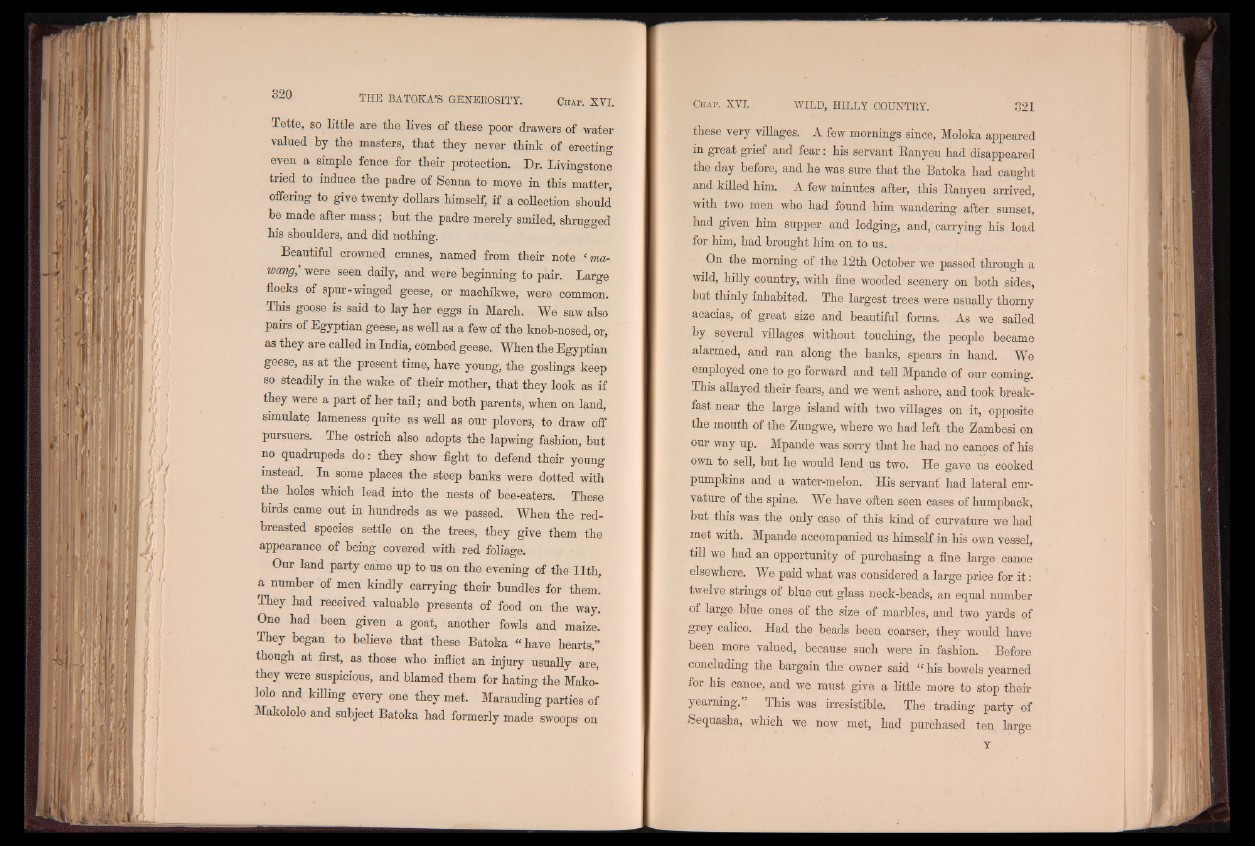
Tette, so little are the lives of these poor drawers of water
valued by the masters, that they never think of erecting
even a simple fence for their protection. Dr. Livingstone
tried to induce the padre of Senna to move in this matter,
offering to give twenty dollars himself, if a collection should
be made after mass; but the padre merely smiled, shrugged
his shoulders, and did nothing.
Beautiful crowned cranes, named from their note ‘ ma-
wang,’ were seen daily, and were beginning to pair. Large
flocks of spur-winged geese, or machikwe, were common.
This goose is said to lay her eggs in March. We saw also
pairs of Egyptian geese, as well as a few of the knob-nosed, or,
as they are called in India, combed geese. When the Egyptian
geese, as at the present time, have young, the goslings keep
so steadily in the wake of their mother, that they look as if
they were a part of her tail; and both parents, when on land,
simulate lameness quite as well as our plovers, to draw off
pursuers. The ostrich also adopts the lapwing fashion, but
no quadrupeds do: they show fight to defend their young
instead. In some places the steep banks were dotted with
the holes which lead into the nests of bee-eaters. These
birds came out in hundreds as we passed. When the redbreasted
species settle on the trees, they give them the
appearance of being covered with red foliage.
Our land party came up to us on the evening of the 11th,
a number of men kindly carrying their bundles for them.
They had received valuable presents of food on the way.
One had been given a goat, another fowls and maize.
They began to believe that these Batoba “ have hearts,”
though at first, as those who inflict an injury usually are,
they were suspicious, and blamed them for hating the Mako-
lolo and killing every one they met. Marauding parties of
Makololo and subject Batoka had formerly made swoops on
these very villages. A few mornings since, Moloba appeared
in great grief and fear: his servant Eanyeu had disappeared
the day before, and he was sure that the Batoka had caught
and killed him. A few minutes after, this Eanyeu arrived,
with two men who had found him wandering after sunset,
had given him supper and lodging, and, carrying his load
for him, had brought him on to us.
On the morning of the 12th October we passed through a
wild, hilly country, with fine wooded scenery on both sides,
but thinly inhabited. The largest trees were usually thorny
acacias, of great size and beautiful forms. As we sailed
by several villages without touching, the people became
alarmed, and ran along the banks, spears in hand. We
employed one to go forward and tell Mpande of our coming.
This allayed their fears, and we went ashore, and took breakfast
near the large island with two villages on it, opposite
the mouth of the Zungwe, where we had left the Zambesi on
our way up. Mpande was sorry that he had no canoes of his
own to sell, but he would lend us two. He gave us cooked
pumpkins and a water-melon. His servant had lateral curvature
of the spine. We have often seen cases of humpback,
but this was the only case of this kind of curvature we had
met with. Mpande accompanied us himself in his own vessel,
till we had an opportunity of purchasing a fine large canoe
elsewhere. We paid what was considered a large price for i t :
twelve strings of blue cut glass neck-beads, an equal number
of large blue ones of the size of marbles* and two yards of
grey calico. Had the beads been coarser, they would have
been more valued, because such were in fashion. Before
concluding the bargain the owner said “ his bowels vearned
for his canoe, and we must give a little more to stop their
yearning. This was irresistible. The trading party of
Sequasha, which we now met, had purchased ten large
Y